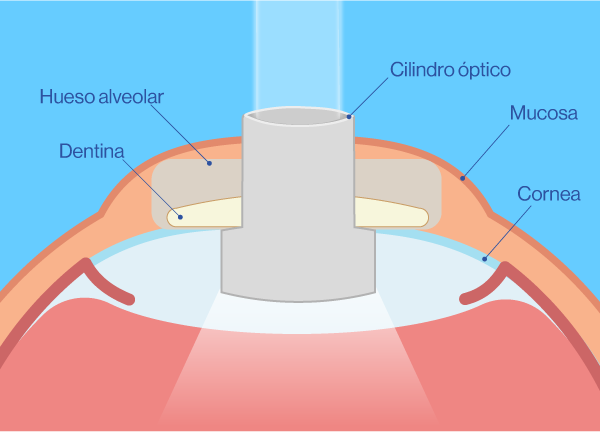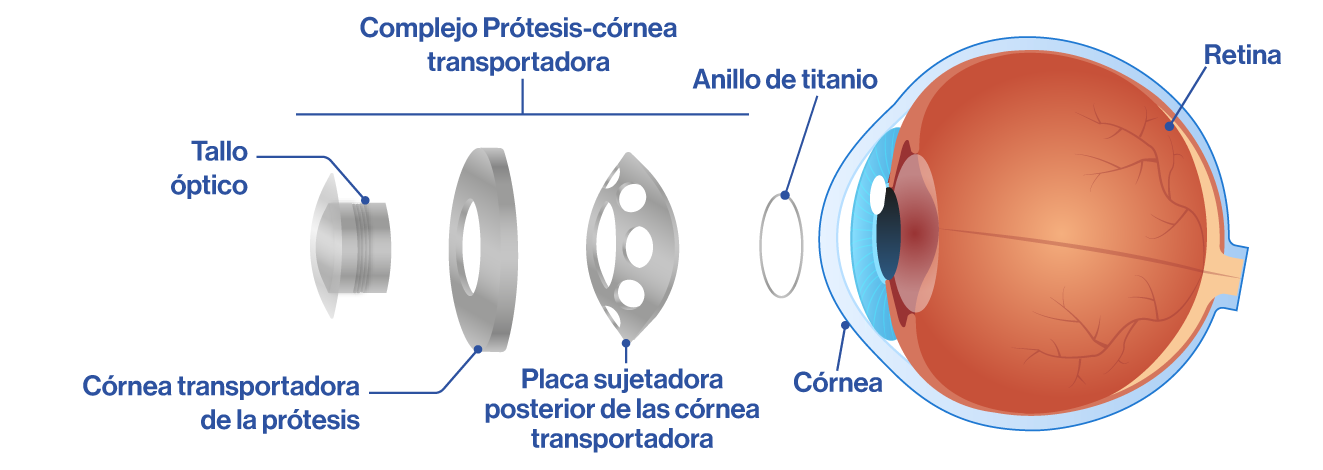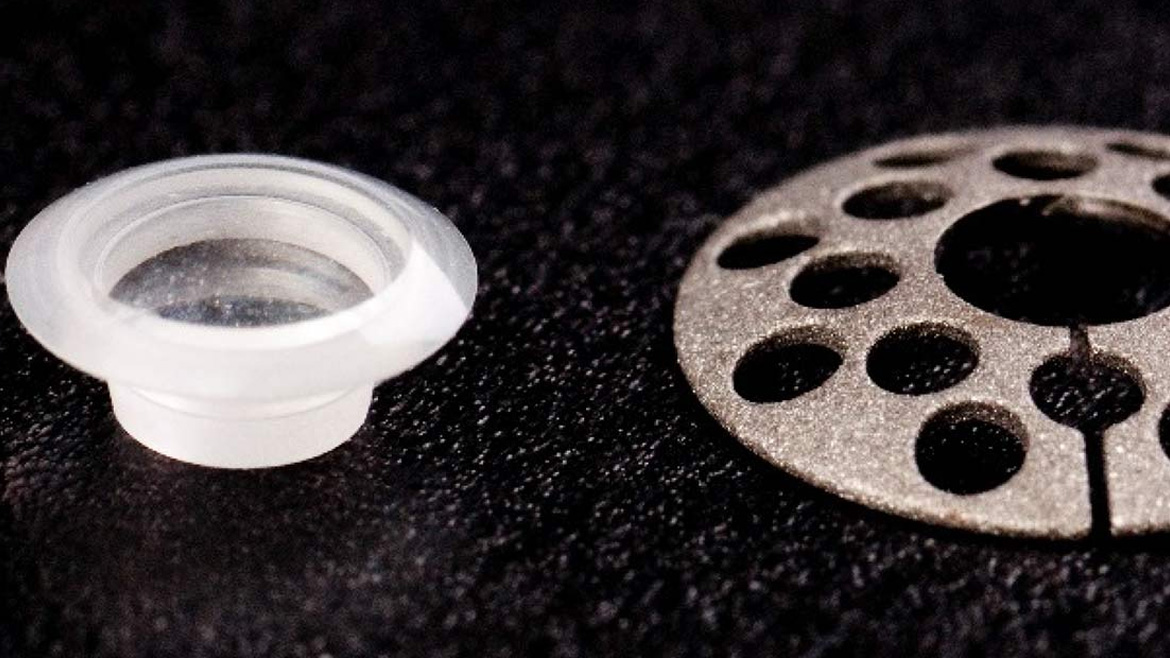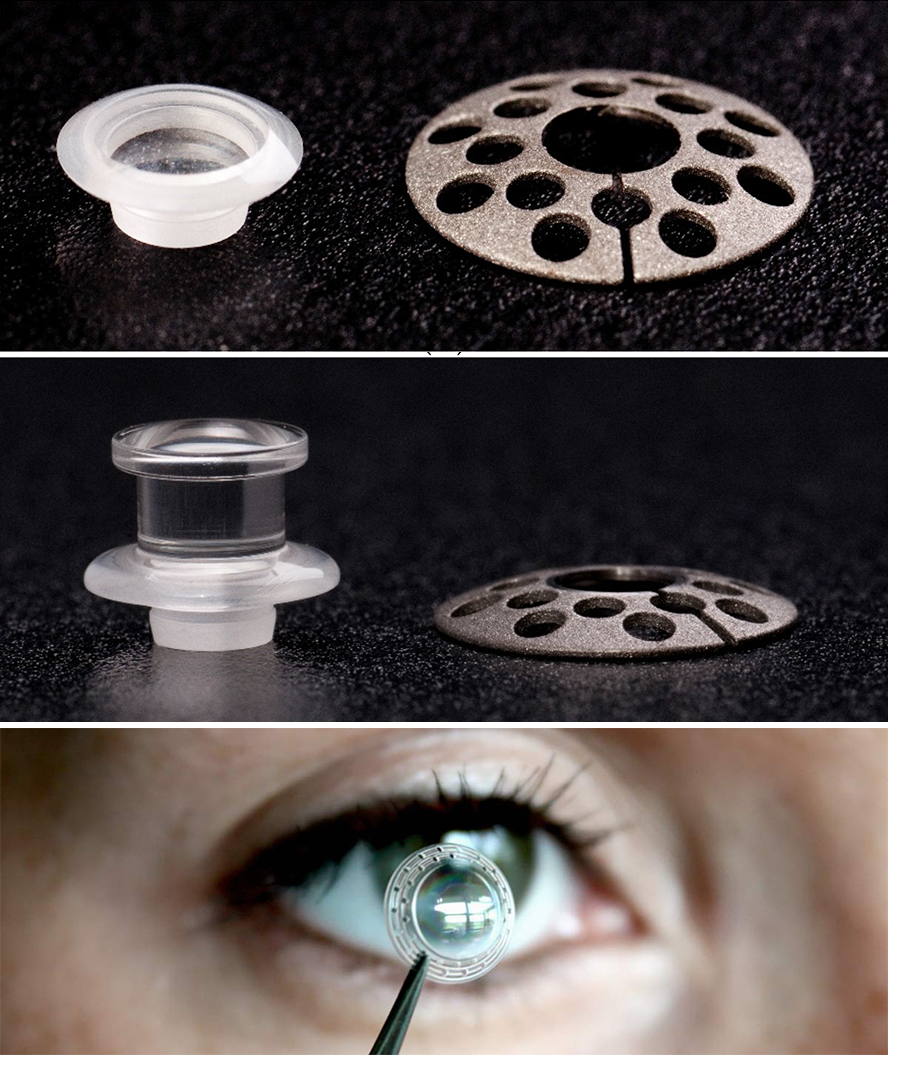What is a Keratoprosthesis?
At Oftalvist Barcelona, a keratoprosthesis is a surgical procedure involving the replacement of a diseased cornea with an artificial one. The prosthetic is made from completely transparent materials that meet the necessary optical and biocompatibility standards to provide excellent quality for the patient.
This procedure is indicated for patients who cannot tolerate donor corneas or suffer from severe bilateral corneal surface diseases, such as conjunctivalization due to total limbal stem cell deficiency or severe dry eye syndrome.
Types of Keratoprosthesis
There are various prosthetic designs and surgical techniques available, all aimed at improving the anatomical and functional outcomes for patients.
Osteo-Odonto Keratoprosthesis (OOKP)

The Osteo-Odonto Keratoprosthesis (OOKP) is an ophthalmic surgical technique designed to restore vision in a blind eye when a traditional corneal transplant has failed or is not feasible. It uses an autologous tooth (typically a canine) as structural support for the optical cylinder.
Candidates for this surgery typically suffer from corneal blindness caused by autoimmune diseases, chemical burns, or trauma—but not those who are congenitally blind or have glaucoma or retinal pathologies.
For this transplant, a segment of the upper canine tooth and its root is extracted and used to hold an optical cylinder. Prior to surgery, an ultrasound must be performed along with proper intraocular pressure control.
The surgical process occurs in three stages:
- Stage 1:
The ocular surface is cleaned and scar tissue is removed. The lens or intraocular implant is extracted, and the inner cheek mucosa is transplanted to protect the surface. This tissue is resistant to severe dryness. - Stage 2:
The canine tooth segment, including bone and root, is prepared, and an optical cylinder (approx. 9 mm long and 4 mm in diameter) is inserted. This unit is implanted under the lower eyelid for 3 months to develop a fibrovascular coating. - Stage 3:
After 3 months, the prosthesis is retrieved from under the eyelid and implanted into the eye. The mucosal graft is repositioned over the implant, leaving a central opening for vision.
Expected Outcomes:
In good anatomical conditions, 75% of patients retain the prosthesis for up to 20 years. Visual outcomes can reach 100% if the retina and optic nerve are intact.
Surgical Risks:
Damage to adjacent teeth, bleeding, infection, glaucoma, membrane formation, extrusion, or retinal complications.
Tibial Bone Keratoprosthesis (Tibia KPro)
This variant uses a piece of the patient’s tibial bone (approx. 10 mm in diameter) to support the optical cylinder. As in the dental method, the implant is placed under the lower eyelid for 3 months to develop vascular tissue.
Outcomes:
More than 50% of patients retain the implant for up to 10 years. As always, visual success depends on the retina and optic nerve.
Risks:
Similar to OOKP. Slightly higher extrusion risk due to faster bone resorption compared to tooth.
Boston Keratoprosthesis (Boston KPro)

This is a preferred procedure for patients with limbal stem cell deficiency or who have failed previous corneal grafts, making traditional keratoplasty unlikely to succeed.
Candidates must have an adequate ocular surface, proper eyelid function, tear production, and healthy retina and optic nerve.
Indications include:
- Failed corneal grafts
- Chemical or thermal burns
- Bullous keratopathy
- Herpetic leucoma
- Certain cases of uveitis
- Limbal deficiency due to contact lens overuse
- Aniridia
Structure:
- Titanium back plate with perforations
- High-grade PMMA optical cylinder (lens-like)
- Donor cornea
- Titanium locking ring
The prosthesis is implanted similarly to a corneal transplant using sutures.
Prognosis:
Excellent visual outcomes are possible if the retina and optic nerve are in good condition. Risks include glaucoma, inflammation, infection, and membranes.
Lifelong postoperative care is essential for long-term success.
Specialists in Keratoprosthesis Surgery
The keratoprosthesis team at Oftalvist Barcelona has been internationally recognized by Harvard Massachusetts Eye and Ear Infirmary as “Distinguished Boston KPro Surgeons”.
- Dr. Juan Álvarez de Toledo Elizalde
Ophthalmologist, Keratoprosthesis Specialist - Dr. María Fideliz de la Paz Dalisay
Ophthalmologist, International Leader in OOKP Surgery


